Hanoi promotes IT application to ensure food safety
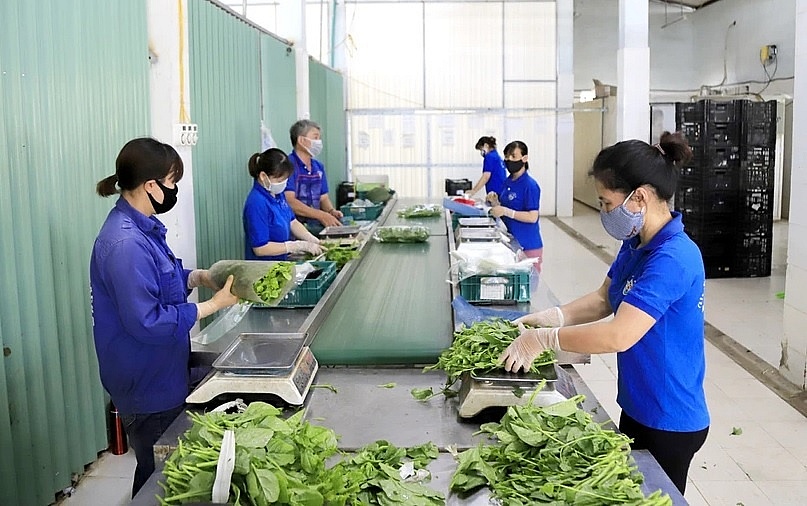 |
| Workers package safe vegetables at Chuc Son Clean Vegetable and Fruit Cooperative in Hanoi’s Chuong My district. (Photo: Hanoimoi.vn) |
Hanoi – The Hanoi Department of Agriculture and Rural Development (DARD) has stepped up the application of information-technology in food safety management to monitor and trace the origin of agro-forestry-aquatic products in the market, contributing to ensuring information transparency and protecting consumer rights.
Intensifying digital transformation and science-technology application in farm produce management will help cooperatives and businesses leverage land advantages and potential, reduce chemical use, and churn out safe, high-quality products.
Nguyen The Lam, Director of Khanh Phong Agricultural Cooperative in Me Linh district’s Tien Thinh commune, said that QR codes have been used in traceability to gain consumer trust, adding consumers can simply scan the QR code on their smartphones to learn about product origin.
Hai Anh Safe Vegetable JSC in Dong Anh district has over 20 hectares of safe vegetables produced in line with VietGAP standards and a closed production process, said its Director Nguyen Van Hanh.
To gain a foothold in the market, the company has integrated traceability information, covering production process, harvesting, packaging, and labelling, into the QR code.
This ensures that consumers can be completely confident in product quality, he said, adding the company supplies about one tonne of safe vegetables to the market each day.
Nguyen Thi Thu Hang, Director of the Hanoi Sub-department of Quality, Processing and Market Development under the DARD, said since the beginning of this year, the agriculture sector has been operating the "System for Tracing the Origin of Agricultural, Forestry, Aquatic, and Food Products in Hanoi" (check.hanoi.gov.vn).
To date, the system has provided accounts for more than 3,500 facilities and 13,949 products, while developing a rapid alert and risk analysis system for food safety in the capital city through a GIS-based software platform for the management of agro-forestry- aquatic products (gis.chicucquanlychatluongnlsts.hanoi.gov.vn).
Additionally, the agriculture sector has supported the expansion of the self-declaration data management system for agro-forestry-aquatic products (tucongbo.sonnptnt.hanoi.gov.vn), and put in place a software system to assess food safety knowledge of production and business facilities in the agro-forestry-fishery sector (tracnghiemattp.chicucquanlychatluongnlsts.hanoi.gov.vn).
The use of information systems in managing the safe agricultural product supply chain has helped cooperatives and businesses shift to modern agriculture. Production and food processing facilities have applied information technology in quality and warehouse logistics management, preservation, and the connectivity of production and consumption chains control product origin and quality.
The development and management of safe food supply chains through digital technology have helped farmers and other stakeholders increase their income and save costs.
However, integrating information-technology into agricultural management still faces many challenges due to the lack of big databases for production, transparency regarding product origin, and information sharing in the stages of production, management, logistics, and trading. Utilising information technology in managing safe agricultural products requires big funding given the limited resources of businesses and cooperatives, leading to uneven investment.
To overcome these difficulties and promote digital transformation in agriculture, the municipal People's Committee will earmark more than 10 billion VND (397,931 USD) from the city’s budget to help districts purchase machinery and equipment in service of digital transformation in the sector.
The department will continue to support digital transformation in the management of production and business activities.
Nguyen Dinh Hoa, Deputy Director of the Hanoi Department of Agriculture and Rural Development, said that in the coming period, the agency will develop the application of electronic information systems using QR codes to trace the origin of safe agro-forestry-fishery products in the city.
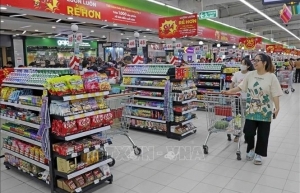 | Hanoi’s consumer price index up 5.51 pc in seven months Hanoi’s Consumer Price Index (CPI) in the January – July period rose 5.51 per cent from the same time last year, according to the city’s statistics office. |
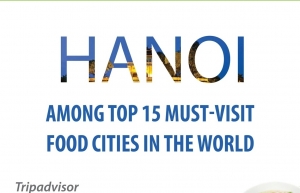 | Hanoi listed among the world’s top 15 must-visit food cities TripAdvisor, the world’s largest travel guidance platform, has recently picked Hanoi among its top 15 must-visit food cities in the world. |
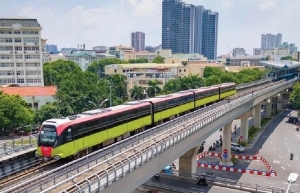 | Nhon-Hanoi Station metro line begins commercial operation The 8.5-km elevated section of the Nhon-Hanoi Station metro line, running from Nhon to Cau Giay, started commercial operation on August 8. This is a significant event that instills confidence in investors regarding the potential for infrastructure development in the capital city, attracting investment for future projects. |
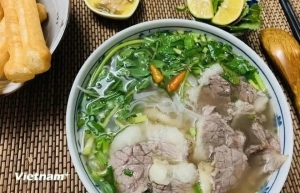 | “Pho” of Hanoi, Nam Dinh recognised as national intangible cultural heritage “Pho” (Noodle soup) of Hanoi capital city and the northern province of Nam Dinh has been named in the national intangible cultural heritage list by the Ministry of Culture, Sports and Tourism. |
What the stars mean:
★ Poor ★ ★ Promising ★★★ Good ★★★★ Very good ★★★★★ Exceptional
Related Contents
Latest News
More News
- Vietnam sets ambitious dairy growth targets (February 24, 2026 | 18:00)
- Masan Consumer names new deputy CEO to drive foods and beverages growth (February 23, 2026 | 20:52)
- Myriad risks ahead, but ones Vietnam can confront (February 20, 2026 | 15:02)
- Vietnam making the leap into AI and semiconductors (February 20, 2026 | 09:37)
- Funding must be activated for semiconductor success (February 20, 2026 | 09:20)
- Resilience as new benchmark for smarter infrastructure (February 19, 2026 | 20:35)
- A golden time to shine within ASEAN (February 19, 2026 | 20:22)
- Vietnam’s pivotal year for advancing sustainability (February 19, 2026 | 08:44)
- Strengthening the core role of industry and trade (February 19, 2026 | 08:35)
- Future orientations for healthcare improvements (February 19, 2026 | 08:29)

 Tag:
Tag:




















 Mobile Version
Mobile Version